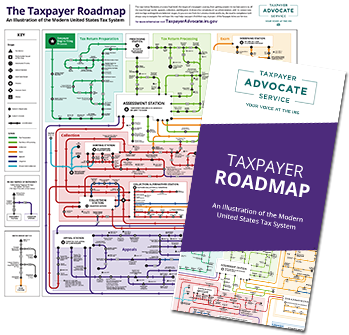Taxpayer Files Return on Paper
View our interactive tax map to see where you are in the tax process. It could help you navigate your way through the IRS.
View our interactive tax map to see where you are in the tax process. It could help you navigate your way through the IRS.

Submitting your tax return electronically ensures greater accuracy than mailing your return, and also results in faster processing of any refund due to you. The e-file system often detects common errors and rejects your tax return, sending it back to you for correction. This could save you delays in processing your tax return. For more information, see e-file options.
If you need to file a paper tax return, consider sending it by certified mail, with a return receipt. This will be your proof of the date you mailed your tax return and when the IRS received it. You may also use certain private delivery services designated by the IRS. For mailing purposes, you can find IRS addresses on IRS.gov.
If you can’t pay the taxes you owe, the IRS has payment options available.
Get Help topics
Browse common tax issues and situations at TAS Get Help
If you still need help
The Taxpayer Advocate Service is an independent organization within the IRS that helps taxpayers and protects taxpayers’ rights. We can offer you help if your tax problem is causing a financial difficulty, you’ve tried and been unable to resolve your issue with the IRS, or you believe an IRS system, process, or procedure just isn’t working as it should. If you qualify for our assistance, which is always free, we will do everything possible to help you.
Visit dev.taxpayeradvocate.irs.gov or call ![]() 1-877-777-4778.
1-877-777-4778.
Low Income Taxpayer Clinics (LITCs) are independent from the IRS and TAS. LITCs represent individuals whose income is below a certain level and who need to resolve tax problems with the IRS. LITCs can represent taxpayers in audits, appeals, and tax collection disputes before the IRS and in court. In addition, LITCs can provide information about taxpayer rights and responsibilities in different languages for individuals who speak English as a second language. Services are offered for free or a small fee. For more information or to find an LITC near you, see the LITC page on the TAS website or Publication 4134, Low Income Taxpayer Clinic List.
Taxpayer Files Return on Paper